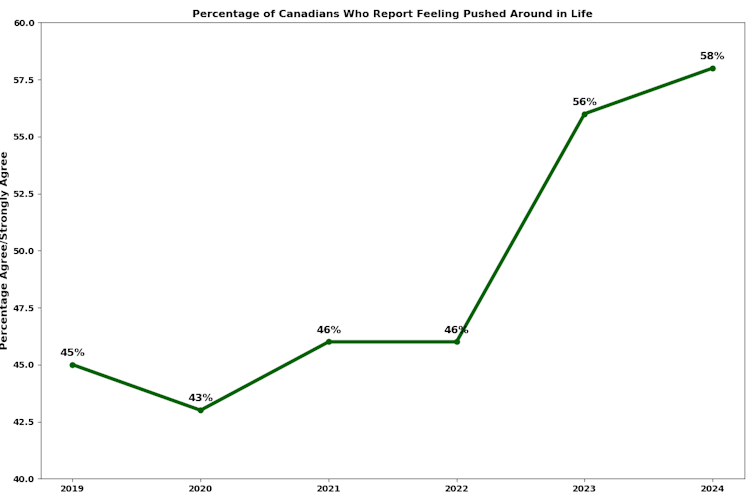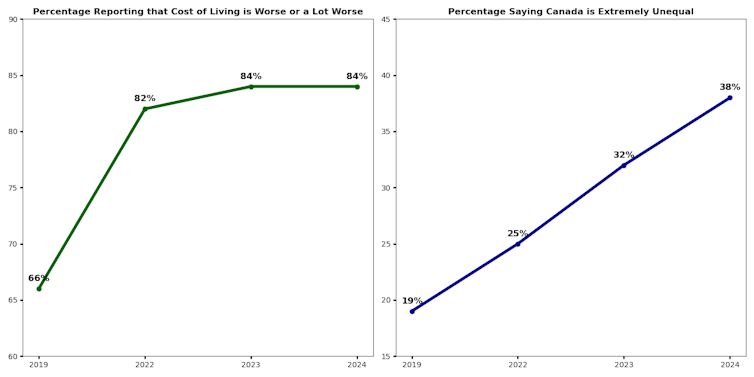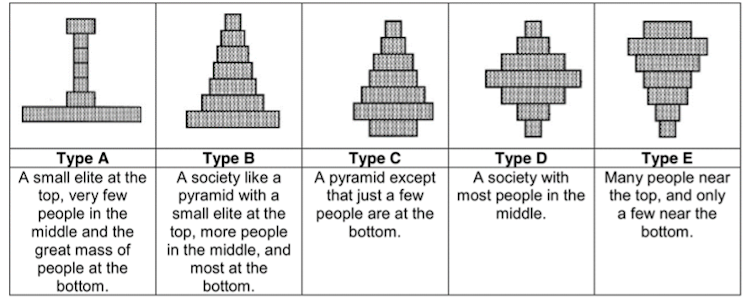Canadians are feeling increasingly powerless amid economic struggles and rising inequality
Posted on December 26, 2024 in Equality Debates
Source: TheConversation.com — Authors: Alexander Wilson, Scott Schieman
TheConversation.com
June 17, 2024. Scott Schieman, Alexander Wilson
If you feel like you’re being pushed around in life, you’re not alone. Our recent research has found that Canadians are increasingly feeling a sense of powerlessness in their lives. This sentiment has been steadily increasing, driven by economic challenges and rising perceptions of inequality.
In 2019, we led a national survey on quality of work and economic life with the assistance of the Angus Reid Group. Since then, we have repeated this survey annually, amassing a dataset of 23,000 Canadians across the socioeconomic spectrum.
We’ve repeated questions that measure what researchers call powerlessness, which captures the lack of personal control and helplessness we feel when dealing with problems and events in life.
One of the most intriguing questions we ask study participants is how much they agree or disagree with this statement: “Sometimes I feel like I’m being pushed around in life.”
In September 2019, 45 per cent of workers agreed with that statement. In September 2020, despite the social and economic turmoil of the pandemic, that dipped to 43 per cent. In 2021 and 2022, 46 per cent agreed with that statement. But then, the needle started to move.

The number of Canadians who report feeling pushed around in life has risen to 58 per cent in 2024 from 45 per cent in 2019. (Scott Schieman)
By 2023, it spiked to 56 per cent. And in our survey of 2,500 Canadian workers fielded in May of 2024, 58 per cent reported they feel pushed around in life.
That’s a 15-point increase from the low in 2020. It’s rare to detect so much movement on a social-psychological measure in such a brief period — that is, unless something dramatic happens.
Economic gloom
Since 2019, we have repeatedly asked Canadians: “How has your experience of the cost of living changed during the past few years? Would you say it has gotten much worse, somewhat worse, stayed the same, gotten somewhat better, or much better?”
In 2019, 66 per cent said that the cost of living had become somewhat or much worse — with 27 per cent reporting much worse. That pre-pandemic baseline was already gloomy. But by 2022, the clouds darkened: 82 per cent said somewhat or much worse — and 34 percent reported much worse.

Since 2019, an increasing number of Canadians have begun to believe the cost of living crisis and inequality are both worsening in the country. (Scott Schieman)
By 2023, 84 per cent declared the cost of living had become somewhat or much worse. And in our May 2024 survey, those numbers held. Now, roughly half of Canadian workers report the cost of living has become much worse.
Since 2019, an increasing number of Canadians have begun to believe the cost of living crisis and inequality are both worsening in the country. (Scott Schieman)
While Canadians have become increasingly pessimistic about the economy and finances, we were astonished by how dramatically the needle has moved.
When economic gloom rises so severely, a spike in powerlessness isn’t surprising. The two are intertwined. Negative news about the cost of living is ubiquitous, so it’s reasonable to think it has an effect.
In 2019, 55 per cent of those who said the cost of living became much worse felt pushed around compared to 43 per cent of those who said it had become somewhat worse. Only 35 per cent of those who said the cost of living had stayed the same felt pushed around.
Our 2024 survey finds a similar pattern — but now it’s intensified: 66 per cent of Canadians who say the cost of living has become much worse feel pushed around, compared to 51 per cent of those who say the cost of living has become somewhat worse. But now, even 46 per cent of those who say the cost of living has stayed the same feel pushed around in life.
Perceptions of inequality
The cost-of-living needle isn’t the only one to move. Perceptions of inequality in Canadian society have shifted significantly, too. And that has also contributed to the steep rise in powerlessness.
To measure perceived inequality, we used a well-established method that researchers have used for decades in the International Social Survey Programme’s Social Inequality Module. In our survey, we showed respondents a diagram of five types of societies and asked them: “Which type of society is Canada today — which diagram comes closest?”

A diagram showing five different types of societies with different levels of inequality. (International Social Survey Programme)
Type A reflects extreme inequality, with a small elite at the top, few people in the middle and most people at the bottom. In our 2019 survey, only 19 per cent saw Canada as Type A. Now, in 2024, a whopping 38 per cent see Canada this way. The share that see Canada as a middle-class society (Type D) plunged from 26 per cent to 15 per cent.
The extreme swing in perceived inequality in just a five-year period is striking — and so is its intensifying link to powerlessness. Back in 2019, 50 per cent of study participants who saw Canada as Type A felt pushed around in life; now, 68 per cent of them do. Perceiving the same level of extreme inequality in Canada now hurts even more.
How powerlessness impacts daily life
The perception of a worsening cost of living, combined with seeing Canada as significantly more unequal, is creating a perfect storm for a deteriorating sense of control in everyday life. Our capacity to get ahead in life now feels more determined by the whims of powerful others.
This is a worrying trend for our collective psychological well-being. The most powerless people tend to be the most distressed and distrustful of others — two indicators that reflect the daily sense of alarm, hopelessness and suspicion that powerless Canadians may feel when thinking of the economy.
The rising sense of powerlessness among Canadians is a concerning trend that reflects deeper economic and social cleavages. It’s crucial to confront these challenges to improve the overall well-being and mental health of Canadians. Our collective quality of life is at stake.
Scott Schieman – Professor of Sociology and Canada Research Chair, University of Toronto
Alexander Wilson – PhD Student, Department of Sociology, University of Toronto
https://theconversation.com/canadians-are-feeling-increasingly-powerless-amid-economic-struggles-and-rising-inequality-231562?utm_medium=email&utm_campaign=Year%20in%20Review%20Business%20%20Economy&utm_content=Year%20in%20Review%20Business%20%20Economy+CID_1e637952fa9fd8931e80322523f6d42b&utm_source=campaign_monitor_ca&utm_term=Canadians%20are%20feeling%20increasingly%20powerless%20amid%20economic%20struggles%20and%20rising%20inequality
This entry was posted on Thursday, December 26th, 2024 at 10:33 am and is filed under Equality Debates. You can follow any responses to this entry through the RSS 2.0 feed. You can skip to the end and leave a response. Pinging is currently not allowed.
 Recent Comments
Recent Comments